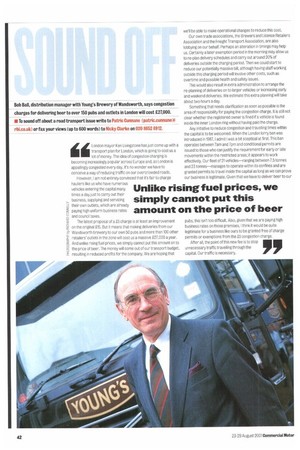i London mayor Ken Livingstone has just come up with a
Page 42

If you've noticed an error in this article please click here to report it so we can fix it.
transport plan for London, which is going to cost us a lot of money. The idea of congestion charging is becoming increasingly popular across Europe and, as London is appallingly congested every day, it's no wonder we have to conceive a way of reducing traffic on our overcrowded roads.
, business, supplying and servicing their own outlets, which are already 6 paying high uniform business rates and council taxes.
‹E The latest proposal of a £5 charge is at least an improvement = on the original £15. But it means that making deliveries from our
-,S' Wandsworth brewery to our own 50 pubs and more than 100 other ,
I retailers' outlets in the zone will cost us a massive £27,000 a year.
And unlike rising fuel prices, we simply cannot put this amount on to the price of beer. The money will come out of our transport budget, resulting in reduced profits for the company. We are hoping that we'll be able to make operational changes to reduce this cost.
Our own trade associations, the Brewers and Licence Retailers Association and the Freight Transport Association, are also lobbying on our behalf. Perhaps an alteration in timings may help us. Certainly a later exemption period in the morning may allow us to re-plan delivery schedules and carry out around 20% of deliveries outside the charging period. Then we could start to reduce our potentially massive bill, although having staff working outside this charging period will involve other costs, such as overtime and possible health and safety issues.
This would also result in extra administration to arrange the re-planning of deliveries on to larger vehicles or increasing early and weekend deliveries. We estimate this extra planning will take about two hours a day.
Something that needs clarification as soon as possible is the area of responsibility for paying the congestion charge. It is still not clear whether the registered owner is fined if a vehicle is found inside the inner London ring without having paid the charge.
Any initiative to reduce congestion and travelling times within the capital is to be welcomed. When the London lorry ban was introduced in 1987,1 admit I was a bit sceptical at first. This ban operates between 7am and 7pm and conditional permits are issued to those who can justify the requirement for early or late movements within the restricted areas; it appears to work effectively. Our fleet of 21vehicles—ranging between 7.5 tonnes and 23 tonnes—manages to operate within its confines and are granted permits to travel inside the capital as long as we can prove our business is legitimate. Given that we have to deliver beer to our pubs, this isn't too difficult. Also, given that we are paying high business rates on those premises, I think it would be quite legitimate for a business like ours to be granted free of charge permits or exemptions from the £5 congestion charge.
After all, the point of this new fee is to stop unnecessary traffic travelling through the capital. Our traffic is necessary.




























































































































